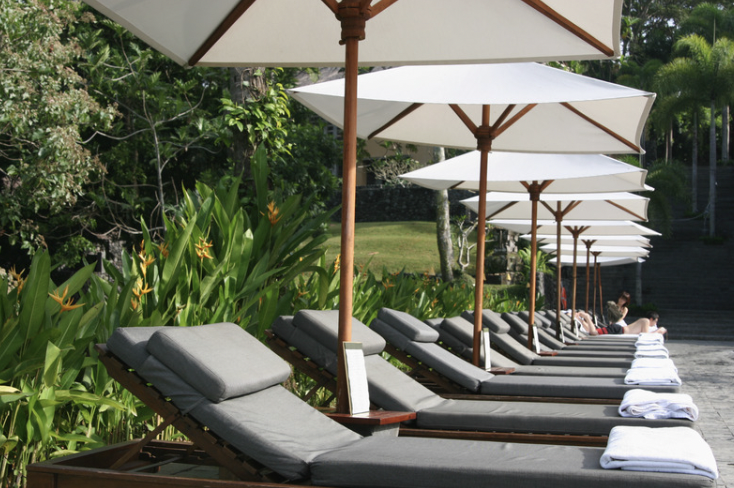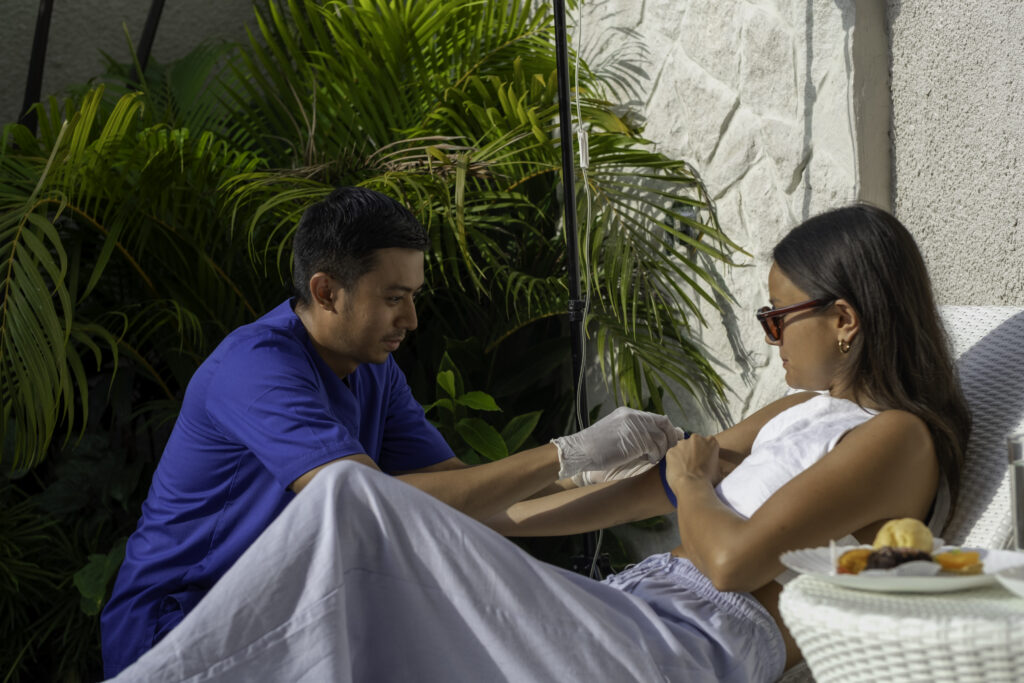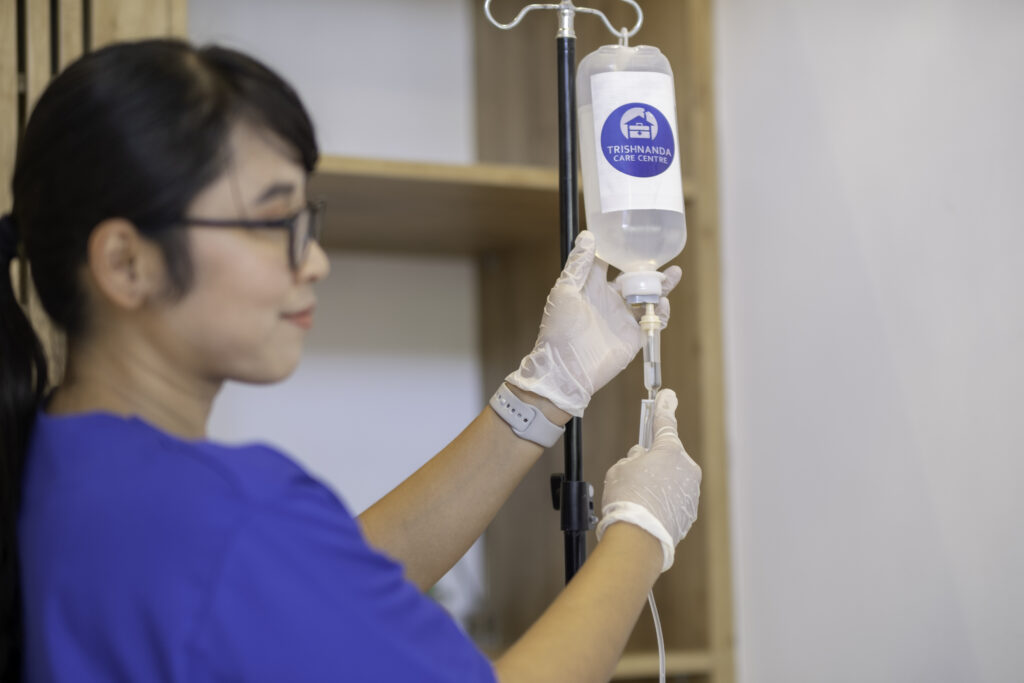
Layanan IV Hangover di Bali: Kapan Cocok dan Kapan Harus Periksa Dulu
Bangun dengan hangover parah di Bali? Matahari Januari 2026 baru saja mengintip di balik rimbunnya pepohonan di villa Anda di
When in Bali, we all know the temptation of staying in the sun all day long. Who doesn’t love the inviting ocean, sunbathing by the pool, or being on a boat to travel to nearby islands? While we’re all aware of the consequences like sunburns—those lobster-red tourists heading to the next pharmacy to grab aloe vera gel—we don’t always consider the hidden risks. One of those risks is heat stroke, and unlike sunburn, it’s not always so obvious or easy to spot.
Heat stroke is more than just a result of being out in the sun for too long. It’s a serious condition that can lead to severe consequences if not treated quickly. Especially in Bali, with its year-round tropical heat and humidity, the risk of heat stroke is very real for both travelers and locals alike. Let’s break down why heat stroke is a health risk you should take seriously and how you can protect yourself while enjoying the island’s beauty.
It’s easy to confuse heat stroke with heat exhaustion, but understanding the difference is key to responding effectively. Heat exhaustion occurs when your body overheats but can still cool down with rest and hydration. Symptoms include heavy sweating, nausea, dizziness, and a rapid pulse. It’s uncomfortable, but with quick action, it’s manageable.
Heat stroke, on the other hand, is much more dangerous and happens when your body can no longer cool itself. Your core temperature rises above 104°F (40°C), and your body starts shutting down critical systems. Symptoms include confusion, dry skin, rapid breathing, and even unconsciousness. This is a medical emergency that requires immediate attention.

Recognizing the signs of heat stroke is crucial in preventing it from becoming life-threatening. Here’s what to keep an eye out for:
If you or someone you’re with experiences these symptoms, act fast – WhatsApp for medical help and begin cooling the person down.

Bali’s weather can be deceiving, with cool ocean breezes making it feel more comfortable than it really is. Here are some simple but effective steps to prevent heat stroke:
If you or someone else is showing signs of heat stroke, immediate action is crucial:

Dehydration is one of the main contributors to heat stroke, and rehydrating quickly can be the difference between recovery and serious complications. At Trishnanda Care Centre, our IV drip services are designed to help rehydrate your body rapidly, ensuring that fluids and electrolytes are replenished directly into your bloodstream for quick recovery. But did you know that IV drips can also prevent heat stroke?
If you’ve been out in the sun for extended periods or feel that you’re on the verge of heat exhaustion, an IV drip can provide a quick solution to rehydrate and balance your body before heat stroke sets in. You can explore our IV drip services here.
Yes, you can recover from heat stroke, but it’s essential to act quickly. Heat stroke is a medical emergency that can lead to permanent damage or even death if not treated immediately. With proper care, such as IV therapy and rest, most people recover fully. However, the faster you get help, the better your chances of avoiding long-term health problems.

If you’re in Bali and worried about heat stroke or any other health issue, Trishnanda Care Centre offers on-call medical services that come directly to you, whether you’re staying at a villa, hotel, or homestay. With our team of medical professionals, we provide the care you need without the stress of finding a clinic. For more information on our doctor-on-call services, visit our Doctor Services page or contact us via WhatsApp for immediate assistance.
Signs include a body temperature over 104°F (40°C), confusion, dry skin, nausea, rapid heart rate, and dizziness. If these symptoms appear, seek medical help immediately.
Heat exhaustion is less severe and can usually be treated with rest, hydration, and cooling down. Heat stroke is a medical emergency requiring immediate action to lower the body’s temperature.
Yes, with fast treatment, you can recover from heat stroke. However, the longer treatment is delayed, the higher the risk of long-term complications.
Move to a shaded area immediately, drink water, and cool your body with a wet towel or take a dip in the pool. If symptoms persist, contact a medical professional.
Yes, especially for those unaccustomed to tropical climates. Bali’s humidity and high UV index can make it easier for travelers to overheat without realizing it.
Prevention includes staying hydrated, avoiding peak sun hours, and using IV drips to maintain fluid balance, especially after long exposure to the sun. Staying cool, taking breaks in the shade, and listening to your body are key to staying safe in Bali’s tropical heat.
Heat stroke is a serious condition, but it’s preventable with a few simple steps. By staying hydrated, protecting yourself from the sun, and knowing the signs of heat exhaustion and heat stroke, you can safely enjoy Bali’s tropical paradise. And if you ever find yourself in need of medical care, Trishnanda Care Centre is just a phone call away—providing reliable and professional healthcare whenever and wherever you need it. Don’t take chances with your health—stay safe, stay cool, and enjoy your time in Bali to the fullest!

Bangun dengan hangover parah di Bali? Matahari Januari 2026 baru saja mengintip di balik rimbunnya pepohonan di villa Anda di

Kapan waktu terbaik untuk melakukan tes NS1? Tes NS1 (Dengue Early Antigen) paling akurat dilakukan dalam 1 hingga 3 hari
Contact Our Doctor Now